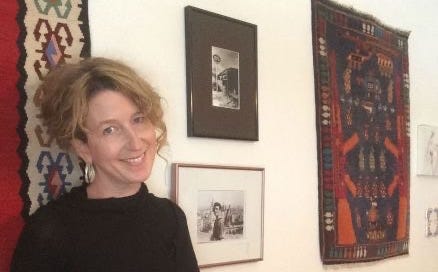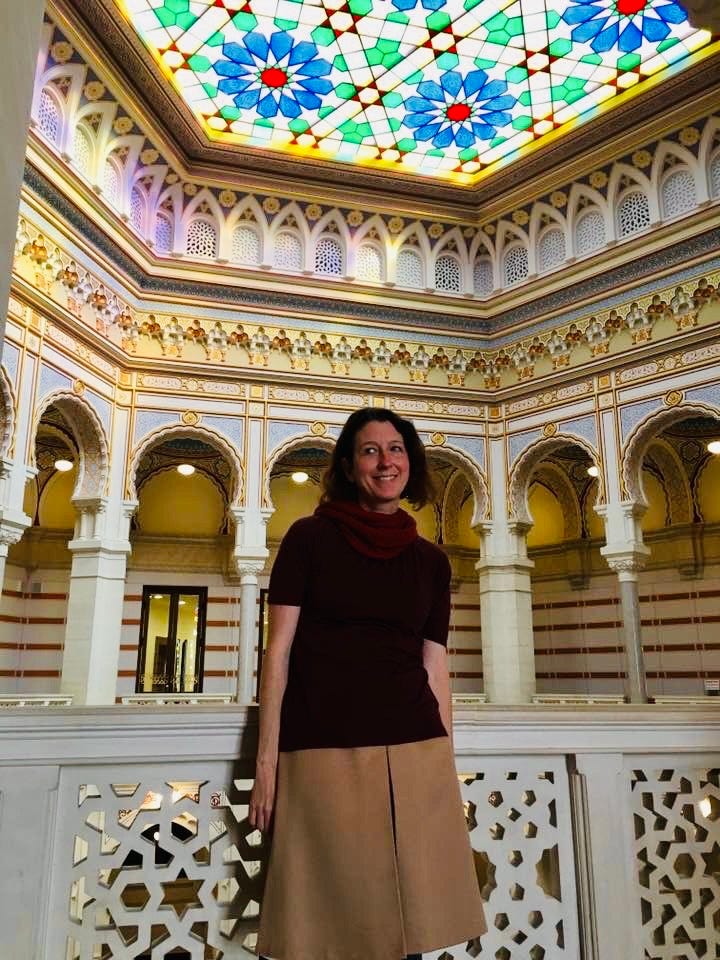Update from February 21, 2025: This interview was originally published in 2021.
Hello friends,
Welcome to this week’s edition of Sifting, shifting, and lifting . . . a weekly column in which I ask clever, curious, compassionate people my three favourite questions.
Today, I am delighted to introduce you to poet, Heathen Derr (aka Heather Derr-Smith), who tackles the toughest subjects—dislocation, disconnection, displacement—with quiet intensity. Not only in their poems but in the wider world, where they draw our gaze, gently but persistently, to those our society too seldom acknowledges: widows, orphans, refugees, and outsiders. They immerse readers in both the sacred and profane, the extraordinary and the mundane, taking us (in the words of one of their poems):
Where every tent has a name,
And every name is the breath of you.
(Excerpt from “The girl named Tents, Tanf Refugee Camp”, The Bride Minaret, The University of Akron Press, 2008.)
Heathen (Heather Derr-Smith) is a graduate of the Iowa Writers’ Workshop (’97) and a poet with five books, Each End of the World (Main Street Rag Press, Editor’s Choice Award, 2005), The Bride Minaret (University of Akron Press, Editor’s Choice Award, 2008), Tongue Screw (Spark Wheel Press, 2016), Thrust (winner of the Lexi Rudnitsky/Editor's Choice Award, Persea Books, 2017), and Outskirts (University of Akron Press, 2022)
They are the founder of Cuvaj Se/Take Care, a nonprofit supporting writers in conflict zones and post-conflict zones and communities affected by trauma.
What issue is engaging your head, heart, and hands right now?
My heart right now is deeply committed to responding to rising nationalism in Europe and the US and the subsequent migrant crisis.
Because of the failed policies of the United States and Europe in the Middle East, there are millions of displaced people desperate for a better life who have risked everything to come to Europe. Thousands of these people are stranded in Bosnia on the border with Croatia right now.
I have a small nonprofit called Čuvaj se/Take Care based in Bihać where the crisis is acute. Our director is a young man from Bihać, a recent MA Lit grad, a writer and translator, and he also volunteers with the Red Cross in the field responding to the needs of migrants and local Bosnians. He’s doing heroic work, which is mostly unpaid, so we are supporting him financially.
I started writing poetry during the Bosnian war in the 1990’s, so the country and my work are deeply linked. When I was a college student the war in the former Yugoslavia broke out, a war that saw the worst war crimes on European soil since World War II, culminating in the genocide of Muslims in Bosnia. There were concentration camps and rape camps and mass graves just a short plane ride away from Rome, Berlin, Vienna.
I was young and naïve at the time, and I could not believe that no one cared or was doing anything to help. I had also just discovered poetry and was taking workshops with Charles Wright, Greg Orr, and Rita Dove. I knew I wanted to be a poet, and I also felt like I had a responsibility to respond with my work and my whole self to what was happening in the wider world. I was engaged as an activist in Washington D.C. working with refugees and selling copies of the Sarajevo newspaper, Oslobodjenje to raise money for relief and then I decided I wanted to go to the region. So, in 1994, I went to volunteer in a refugee camp in Gašinci, Croatia and delivered humanitarian aid into Bosnia.
Now, nearly thirty years later, I watched Trump rise to power in the US using the exact same rhetoric that caused countless deaths in the century before. Thank God we are rid of Trump (for now), but we are not rid of this illiberal movement that is global in its scope. It’s still powerful here in the US and it’s rising all over Europe. Fascism continues to grow in our time.And I’m committed to fighting it as long as I live.
Now, Bosnia is on the front lines in this struggle, as migrants trying to get to the EU are stopped at the border with Croatia, beaten by police and thrown back onto the Bosnian side. Bosnia is a poor country, without enough government resources to adequately address the needs of the migrants and refugees. So, I’m doing what little I can to support our director there as he does the hard work on the ground.
What artist or work of art has had a profound impact on the way you see the world and your place in it?
Muriel Ruykeyser has been a big influence for me. She went over during the Spanish Civil War in the 1930’s to fight fascism with the International Brigades but then was told she would be of more use writing poetry. Her book Life of Poetry has meant a lot to me, and I love her idealistic notion of poetry’s ability to change the world. I really do believe in the absolute necessity of poetry, as CD Wright said in her book Cooling Time, “Maybe I did not choose poetry primarily because I believed it to be a necessary good, but I have abided by it because I believe this.”
I’ve also been influenced by Albert Camus and his insistence on our own responsibility for every choice we make daily on how we will live our lives. Locating a sense of purpose in the face of uncertainty and absurdity formed my earliest drive to write.
I often say that it was the film Wings of Desire that made me want to become a poet. I wanted to do what those recording angels were doing, laying their hands on people, listening to their thoughts and observing the daily moments that make up a life, and then for one of them, ultimately, longing to become mortal and die—to be truly alive. For me this represents the process of transforming words written on a page into the communal embodiment of the poem—to bring the reader into a direct experience with the poem that bonds them to others human beings, creatures, the earth, the ineffable.
But ultimately it was the people of Sarajevo during the Bosnian war. Enduring the longest siege in modern history since the siege of Leningrad, the citizens of Sarajevo were determined to keep culture alive under conditions of constant shelling, sniper fire, and starvation. They held concerts, put on plays, exhibited art, read poetry, all in resistance to fascism and nationalism.
Many artists from around the world were so inspired by this they came to Sarajevo in solidarity. Susan Sontag came in 1993, when the siege was at it absolute worst, to put on the play Waiting for Godot. Bruce Dickinson from Iron Maiden came to perform a concert and he later said that was the most important and most meaningful show of his life.
One of my best friends was a soldier on the front lines defending his city from annihilation and after his shift of fighting was done, he would walk an hour and a half under threat of shelling and snipers in absolute pitch darkness to get into the city center to go to a concert or performance. It’s what kept him alive and what kept so many Sarajevans alive, but more than just alive—kept them human.
Seeing how important art was in sustaining people against the forces of genocide had the most profound effect on me in my development as a poet.
There are so many good organizations working to transform our world through compassionate action. Who would you like to lift up?
I would love a specific call to action to donate right now to my nonprofit, Cuvaj se/Take Care. We are supporting Adnan Kurtagic, a young Bosnian writer from Bihac who is working day and night with migrants trapped on the border between Bosnia and Croatia. Many of these are refugees from Afghanistan.
Adnan triages the injured and sick, organizes blood drives, collects donations of shoes and clothing, and right now has a project building a washing facility for migrants to be able to wash clothing. He has a team of dozens of volunteers under him and together they are able to implement so much good.
Every single penny goes directly to Adnan, to pay him a living wage and to help him in buying supplies so that he can continue to do this work. In supporting him, you are really making a huge difference, affecting exponential change in the community.
Readers can make a donation here:
Not yet a subscriber? Pull up a chair. There is always room for one more.
Before you go
Would you do me a small favour? If you enjoy reading Sift. Shift. Lift. please take a moment to like, share, or comment below. It is a simple gesture, but it gives new-ish publications like Sift. Shift. Lift.—and creators like me—a much-appreciated boost.
Thank you my friends.











"One of my best friends was a soldier on the front lines defending his city from annihilation and after his shift of fighting was done, he would walk an hour and a half under threat of shelling and snipers in absolute pitch darkness to get into the city center to go to a concert or performance. It’s what kept him alive and what kept so many Sarajevans alive, but more than just alive—kept them human." ...I'm going to be thinking about this today.
I am delighted to discover Heathen Derr’s work, and not merely because we have a few things in common despite never having met and belonging to different generations. (I too admire Muriel Rukeyser, who came to my home state of Alabama to be present at the trial of the Scottsboro Nine. Greg Orr was a good friend to me when we both lived in Virginia in the 1970s. And I gave poetry readings all over Bosnia-Herzegovina in 1980, as part of a busload of poets roaming from Sarajevo to Mostar, as a poor last-minute substitute for Mark Strand.)
I saw Wings of Desire and Faraway So Close in reverse order. “Why can’t I be good?” Why, indeed. An angel gives up his wings to become human because he wants to help, and within a few days he’s drunk, sleeping in the gutter, trafficking in weapons and child porn. Does our capacity for self-delusion spring from divine origins?
What, I wonder, would be today’s equivalent of a film starring Natassja Kinski, Mikhail Gorbachev, and Lou Reed?
Anyway, by featuring Heathen Derr, SiftShiftLift inspired me to read all their poems on poets.org and to order their latest from Amazon. I’d rather go to a bookstore, but I want it now!